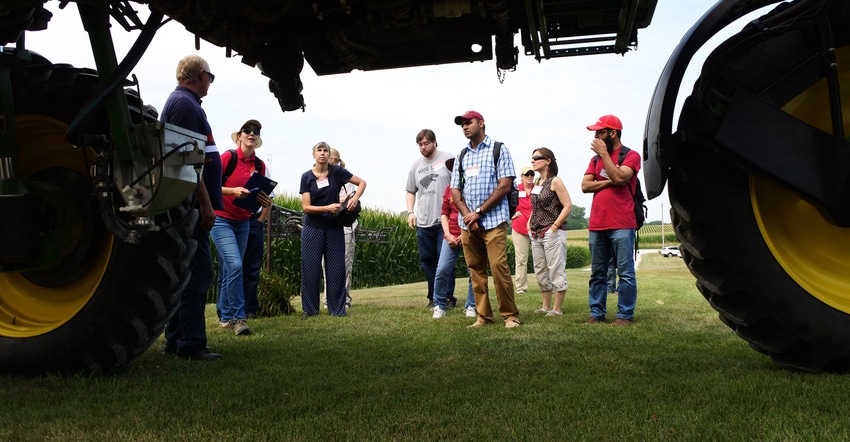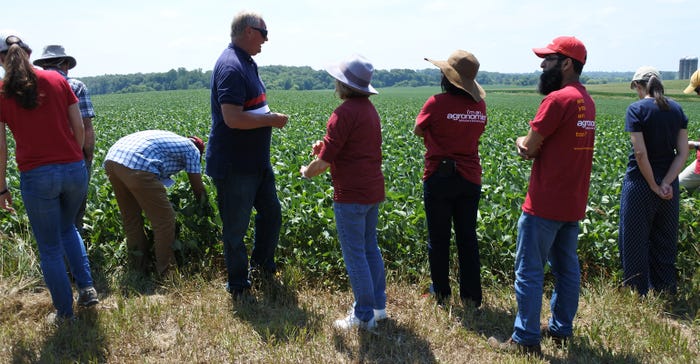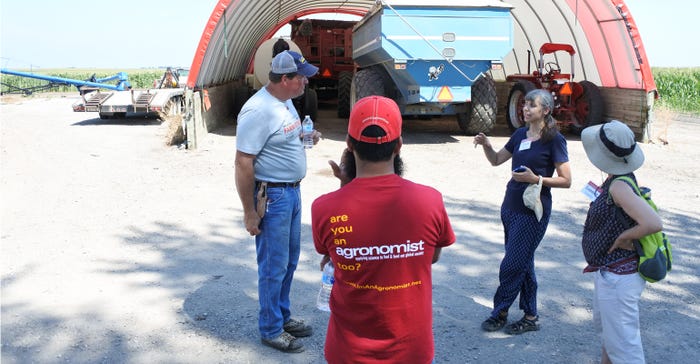August 11, 2017

By Ed Adcock
Iowa’s countryside became a classroom for several Iowa State University faculty members and researchers last month when they toured two farms to learn more about farming.
The Iowa Soybean Research Center, at Iowa State, in cooperation with the Iowa Soybean Association sponsored the tour, which took place July 19. The center was created in 2014 to increase collaboration, coordination and integration among Iowa State, the Iowa Soybean Association, industry and farmers to align the soybean-related activities at ISU with the needs of Iowa soybean farmers and the industry that supports production of the crop.
“The field tour was the center’s first formal event taking campus research and Extension faculty, students and staff to visit row-crop farming operations in Iowa,” said Greg Tylka, director of the center and an Iowa State nematologist. “One of the goals of the farm visits is to have ISU personnel see how modern corn and soybean farming is done in Iowa and to gain a perspective of how complicated farming can be.”
Researchers asked the questions this time
The group of about 16 researchers visited Cliff Mulder’s family farm near Pella and Dave Struthers’ family farm near Collins. Usually, farmers ask questions of researchers. This time the roles were reversed.

IN THE FIELD: Crop scientists from ISU viewed his crops and discussed with farmer Cliff Mulder the practical problems he faces in producing soybeans and corn.

Mulder is a former Iowa Soybean Association board director and former president of the North Central Soybean Research Program, a farmer-led organization that invests soybean checkoff dollars in regional research. Struthers, an Iowa Soybean Association member, and his family operate a farrow-to-finish hog business and raise soybeans and corn.
The farmers took questions about their operations, talking about aspects of farming, including financing, equipment, crop and livestock production. They stressed the importance of research and Extension in providing information they use to improve their crop production.
“During the day, we heard our farmer hosts talk about machinery, computer technology, agronomy, pathogen and pest management, financing and marketing. I think we achieved the goal of having our group learn about how complicated farming is,” Tylka said.
Understanding farmers’ concerns, needs
Silvia Cianzio, an agronomy professor and soybean breeder who went on the tour, appreciated the chance to talk directly to the farmers.
“What I experienced on the tour was the pleasure of asking questions to my ‘partners’ and receiving answers that really complete my understanding of their concerns and needs,” she said. “With that open communication, I feel that my contributions will be more meaningful.”
Cianzio said she feels she works for the state’s farmers. “If in addition to conducting research, training students, etc., I do not deliver something useful to farmers, I feel that my commitment is incomplete.”
Gwyn Beattie, a professor of plant pathology and microbiology, also found the tour valuable for background when considering ways to apply research that farmers can use.
Farm visits foster collaborative research
“When I think about translating discoveries into practices for growers, the small size of their profit margins is an excellent reality check,” Beattie said. “This reality encourages me to consider ways to translate knowledge into improved cultural practices rather than simply into potential new products. For example, within my area [agricultural microbe], we have a lot to learn about fostering beneficial microbial communities rather than, or in addition to, developing microbe-based products.”
The farm visits foster collaborative research, communication and outreach with Iowa State to help soybean farmers maximize their competitiveness through greater productivity, profitability and sustainability, according to Ed Anderson, senior director of research for the Iowa Soybean Association.

ECONOMICS: The group also visited Dave Struthers on his farm near Collins. He fielded questions on farm profitability, financing and conservation practices.

“ISA was involved because of our support of and engagement with the Iowa Soybean Research Center and so many Iowa State researchers and their projects funded by the soybean checkoff,” Anderson said. “Whether in the field or on campus, these farmer and researcher interactions bring great value and deeper, broader understanding for all parties involved.”
Tylka said the Iowa Soybean Research Center tour is considering a tour this September to follow up on the farms as they prepare for harvest. For more information, visit the Iowa Soybean Research Center at ISU online.
Adcock is a communications specialist with ISU College of Agriculture and Life Sciences.
You May Also Like




